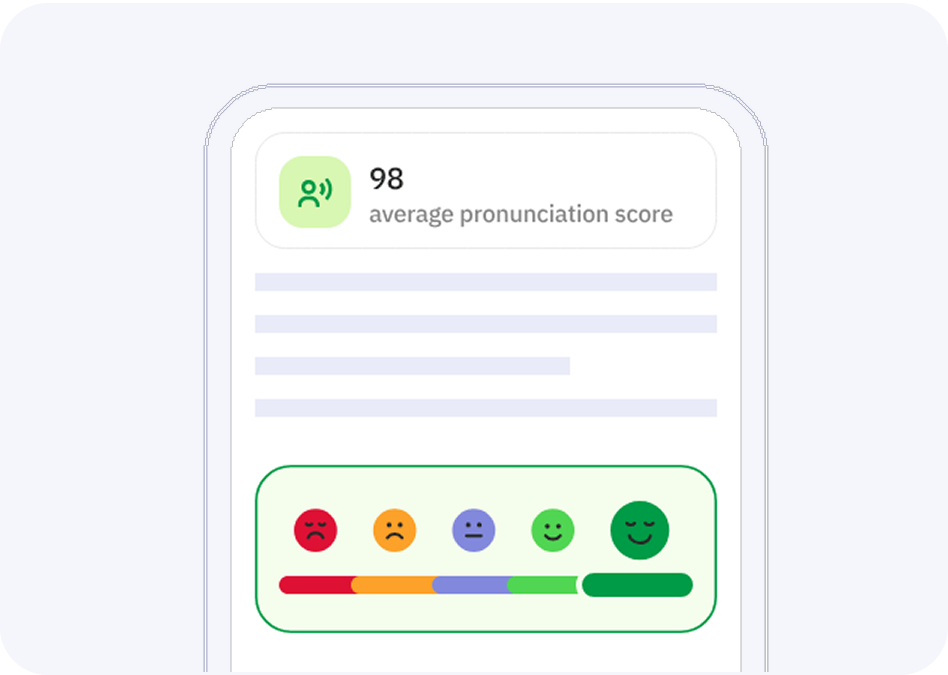Improve Speaking
Learning a new language is an exciting and rewarding endeavor, but it can also be challenging, especially when it comes to improving your speaking skills. To help you on your language learning journey, we’ve compiled a list of tips and strategies for improving your speaking skills. These tips are designed to help you build a strong foundation, enhance your conversational skills, overcome fear and anxiety, and develop advanced speaking abilities. So, let’s get started!

The talkpal difference

Personalized Education
Every student has a distinct approach to acquiring knowledge. Through Talkpal technology, we analyze the study patterns of millions simultaneously to build highly effective educational environments that adapt specifically to individual needs. This ensures your journey is fully customized based on your interests and goals rather than a generic curriculum.

Cutting-Edge Technology
Our central mission is to lead the way in providing universal access to a tailored learning journey. By utilizing the most recent breakthroughs in artificial intelligence and modern software, we ensure that everyone can benefit from a sophisticated and personalized educational experience.

Making Learning Fun
We have transformed the study process into a delightful activity. Staying motivated while learning online can often be a struggle, so we designed Talkpal to be incredibly captivating. The platform is so engaging that users frequently prefer mastering new language skills over playing video games.
LANGUAGE LEARNING EXCELLENCE
The most efficient way to learn a language
Try Talkpal for freeTips for improving basic speaking skills
The ability to speak a language fluently and accurately is crucial for effective communication. Speaking skills not only allow you to express your thoughts and ideas but also help you understand and connect with people from different cultures. Furthermore, strong speaking skills can boost your confidence, improve your listening skills, and increase your overall language proficiency.
Practice regularly
Consistent practice is essential for improving your speaking skills. Set aside a specific time each day to practice speaking, even if it’s just for a few minutes. The more you practice, the more comfortable and confident you’ll become in speaking the language.
Speak with native speakers
Interacting with native speakers is one of the most effective ways to improve your speaking skills. Native speakers can provide valuable feedback, correct your mistakes, and expose you to the natural rhythm and flow of the language. Look for language exchange partners, attend language meetups, or join online language learning communities to connect with native speakers.
Record yourself
Recording yourself speaking in your target language is a great way to monitor your progress and identify areas that need improvement. Listen to the recordings to pinpoint any pronunciation errors or awkward pauses, and work on refining your speech over time.
Learn pronunciation rules
Understanding and applying the pronunciation rules of your target language is essential for clear and accurate speech. Study the language’s phonetic system, learn the correct pronunciation of vowels and consonants, and pay attention to intonation and stress patterns.
Use language learning apps
Language learning apps like Talkpal, Duolingo, Babbel, and Rosetta Stone can help you improve your speaking skills by providing interactive lessons, quizzes, and pronunciation exercises. These apps offer a convenient and engaging way to practice speaking on your own, at your own pace.
Tips for enhancing conversational skills
Engage in small talk
Small talk is an excellent way to practice speaking and improve your conversational skills. Start by learning common greetings, asking simple questions, and responding to answers. As you become more comfortable, gradually expand the range of topics you can discuss.
Master common phrases and idiomatic expressions
Familiarizing yourself with common phrases and idiomatic expressions can make your speech sound more natural and fluent. Study phrases that are frequently used in everyday conversations, such as greetings, farewells, and expressions of gratitude. Additionally, learn idiomatic expressions that are unique to the language and culture.
Learn the vocabulary of your interests
To engage in more meaningful conversations, learn the vocabulary related to your hobbies, interests, and professional field. This will allow you to discuss topics that you’re passionate about and make connections with like-minded individuals.
Use conversation starters
Having a few conversation starters in your arsenal can help you initiate and maintain conversations with native speakers. These can be simple questions or interesting facts that encourage further discussion. For example, you might ask about someone’s favorite travel destination or share an interesting piece of news.
Tips for overcoming fear and anxiety
Embrace mistakes
Mistakes are a natural part of the language learning process. Instead of fearing them, embrace them as opportunities to learn and grow. Remember that native speakers are often understanding and patient with language learners, so don’t be afraid to make mistakes when speaking.
Establish a safe environment
Creating a safe and supportive environment for practicing speaking can help alleviate fear and anxiety. This might involve practicing with a trusted friend or family member, joining a language learning group with a non-judgmental atmosphere, or using online platforms that allow for anonymity.
Set realistic goals
Setting achievable speaking goals can help you stay motivated and reduce anxiety. Break your speaking objectives into smaller, manageable tasks, and celebrate your progress along the way. Remember that language learning is a long-term process, and it’s essential to be patient with yourself.
Tips for advanced speaking skills
Focus on fluency and accuracy
As you become more proficient in your target language, work on improving both fluency and accuracy. Fluency is the ability to speak smoothly and effortlessly, while accuracy involves using correct grammar, vocabulary, and pronunciation. To achieve a balance between the two, practice speaking at a natural pace and pay attention to grammatical structures and word choice.
Improve your listening skills
Developing strong listening skills can significantly enhance your speaking abilities. By paying close attention to native speakers, you can pick up on nuances in pronunciation, grammar, and vocabulary. Additionally, being an active listener can help you respond more effectively in conversations.
Develop a personal style
As you become more confident in your speaking abilities, work on developing a personal style that reflects your personality and interests. This might involve adopting specific expressions, using humor, or incorporating storytelling techniques. A unique speaking style can make your speech more engaging and memorable.
Conclusion
Improving your speaking skills for language learning is a rewarding and achievable goal. By following these tips and strategies, you can build a strong foundation, enhance your conversational skills, overcome fear and anxiety, and develop advanced speaking abilities. Remember that practice, perseverance, and patience are key to successful language learning. So, take a deep breath, start speaking, and enjoy the journey!
The most efficient way to learn a language
Try Talkpal for freeFrequently Asked Questions
How long does it take to become fluent in a new language?
Can I improve my speaking skills without a conversation partner?
Which language learning app is best for improving speaking skills?
How can I improve my pronunciation in a foreign language?
What is the future of AI in language learning?







